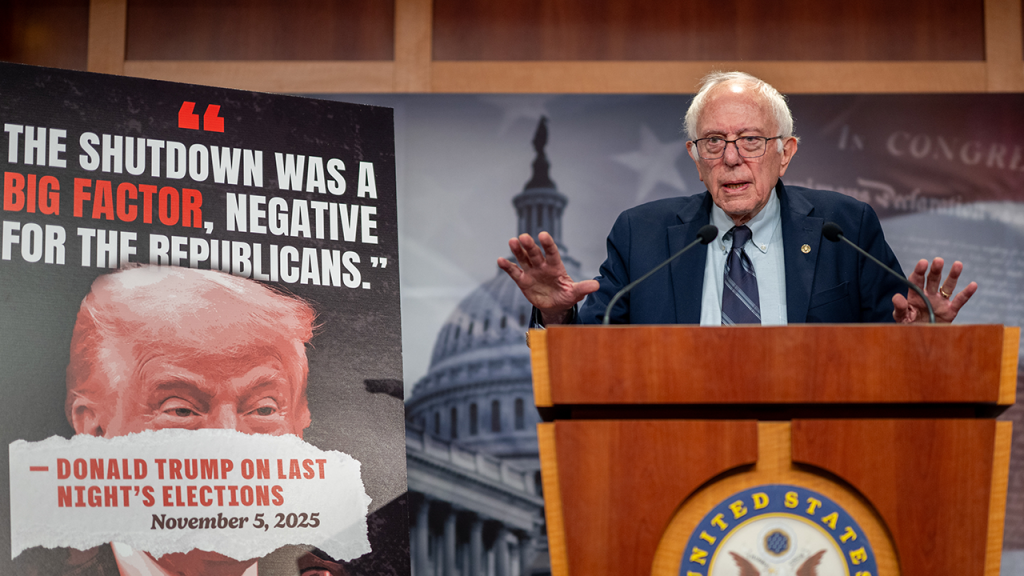Bernie Sanders Criticizes Democratic Colleagues on Budget Vote, Warns of Healthcare Consequences
In a passionate critique shared on social media, Senator Bernie Sanders expressed deep concern over a recent Senate procedural vote where eight Democrats joined Republicans to advance a continuing resolution to fund the government. The Independent Vermont senator didn’t mince words, calling it “a very, very bad vote” that contradicted what he believes American voters signaled in the recent election. According to Sanders, this vote wasn’t merely about keeping the government operational—it represented a fundamental policy direction that could undermine healthcare protections for millions of Americans while benefiting the wealthiest taxpayers.
Sanders’ criticism centered on three major concerns about the resolution’s implications for healthcare access. First, he warned that the measure would significantly increase healthcare premiums for over 20 million Americans, potentially doubling, tripling, or even quadrupling costs for people already struggling with the highest healthcare prices in the world. Second, Sanders cautioned that the resolution “paves the way for 15 million people to be thrown off of Medicaid,” citing studies suggesting this could result in approximately 50,000 unnecessary American deaths annually. Finally, he argued these healthcare sacrifices were being made to provide “a trillion dollars in tax breaks to the 1%”—a trade-off he finds morally unacceptable and politically tone-deaf following the recent election where, in his view, Americans rejected this kind of approach.
The senator’s frustration appeared particularly acute given the timing of the vote, coming just days after a national election. “As everybody knows, just on Tuesday, we had an election all over this country,” Sanders noted in his video. “And what the election showed is that the American people wanted us to stand up to Trumpism—to his war against working-class people, to his authoritarianism. That is what the American people wanted. But tonight, that is not what happened.” This framing suggests Sanders sees the vote not just as a policy disagreement but as a failure of some Democratic colleagues to honor what he interprets as the voters’ mandate to protect working-class interests and resist policies that primarily benefit the wealthy at the expense of vulnerable Americans.
Sanders’ concerns about healthcare coverage reductions are supported by analysis from nonpartisan sources. The Congressional Budget Office has indicated that ending enhanced Affordable Care Act subsidies (which were enacted under the American Rescue Plan) would substantially increase out-of-pocket costs for millions enrolled in ACA marketplaces. Studies cited by the Senate Committee on Health, Education, Labor, and Pensions—which Sanders chairs—estimate that significant Medicaid cuts could lead to tens of thousands of preventable deaths each year. A 2023 committee report referenced peer-reviewed research showing higher mortality rates associated with Medicaid coverage loss due to reduced access to preventive and emergency care. Additional research from Yale School of Public Health and the University of Pennsylvania’s Leonard Davis Institute of Health Economics has warned that proposed federal healthcare cuts “could lead to over 51,000 preventable deaths annually.”
These healthcare concerns reflect Sanders’ longstanding policy priorities and his consistent opposition to budget proposals that he believes favor the wealthy at the expense of working Americans. The senator has regularly addressed these themes in press releases and policy statements dating back to early 2023, emphasizing his view that healthcare should be treated as a right rather than a privilege. “We have a lot of work to do, but to be honest with you, tonight was not a good night,” Sanders concluded in his video message, signaling his determination to continue advocating for universal healthcare despite this setback. “We’ve got to go forward, do the best that we can to ensure and protect working-class people, to make sure that the United States not only does not throw people off of healthcare, but ends the absurdity of being the only major country on earth that doesn’t guarantee healthcare to all people.”
The controversy highlights ongoing tensions within the Democratic Party about tactical approaches to governance and negotiations with Republicans, particularly on budget and healthcare issues. Sanders’ public criticism of fellow Democratic senators who voted with Republicans represents a significant moment of intra-party disagreement during a period of transition following the election. It underscores the continuing challenge Democrats face in balancing pragmatic governance with progressive policy goals, especially regarding healthcare access and economic inequality—issues that have defined Sanders’ political career and continue to be flashpoints in American political discourse. Whether this vote represents a momentary tactical difference or signals a deeper division within the Democratic coalition about policy priorities in the coming years remains to be seen.















